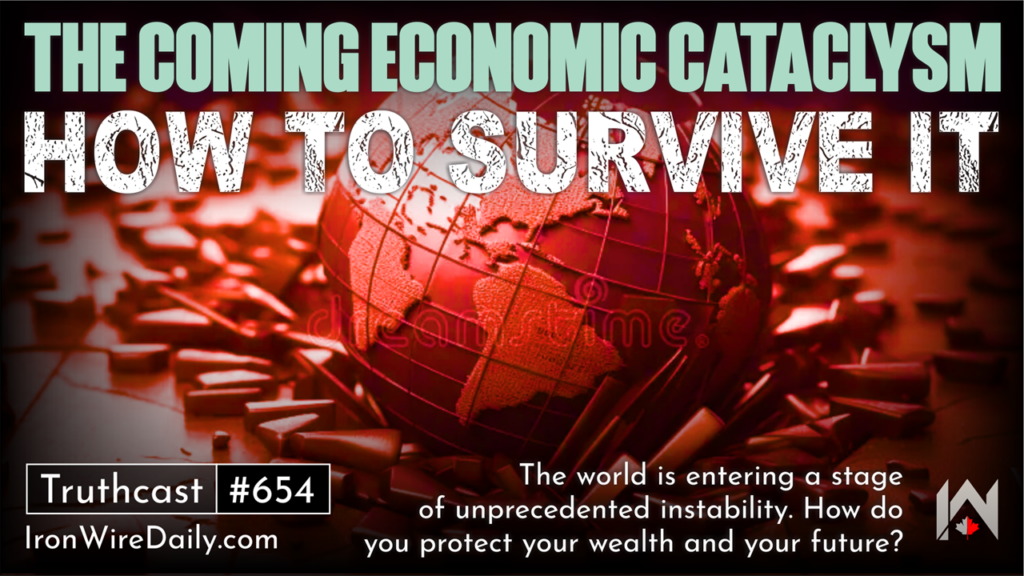(0:00 - 0:30)
Many doctors today are still stuck in the big pharma regime of prescribing drugs for everything under the sun, often making the health issues their patients are experiencing even worse. But increasingly, research is showing that in many cases drugs are not the answer. Dr. Sabine Hazan has been doing groundbreaking research for decades on the gut microbiome, and understanding it might well be the cure for most things that ail us.
(0:31 - 2:41)
Her book, Let's Talk Shit, Disease, Digestion, and Fecal Transplants, is a window into that research and the radical improvements many of her patients experience when their gut microbiome issues are addressed. And it extends to far more than just the things you might think, like obesity, diabetes, and inflammatory bowel disease. Dr. Hazan's research has given some of her patients dramatic improvements in conditions like Alzheimer's, Parkinson's, Crohn's disease, arthritis, and even depression, anxiety, and autism.
In this interview, Dr. Hazan shares some of the results of her research, outlining the complexities of a condition for which there is no one-size-fits-all cure, but also giving hope that in time, ways may be found to analyze each patient individually and provide treatments that can lead to longer, healthier, and happier lives. Dr. Hazan, welcome to the show. Thank you.
Thank you for having me. And I've invited you because I read your excellent book. And yes, in this particular instance, we can say shit on my show because it's in the title of your book.
Yes, let's talk shit. And it's all about the gut microbiome, which people don't understand is incredibly important to our health, not just our health, our mental health, everything. So while I've known about this for years, for our viewers who don't, could you please give as brief as possible an overview of just how important the gut microbiome is? The microbiome is your immunity.
So immunity starts in the gut. It starts with microbes that are doing something to help you absorb vitamins, absorb minerals, decompose sugar, etc., break down foods. Those microbes are a huge necessity for digestion, but also for metabolism, for mitochondrial function.
(2:42 - 5:17)
So it starts in the gut. If you don't have the microbes that are degrading the sugar, you're not absorbing sugar. If you don't have the microbes that degrade and help absorb calcium, you're not going to absorb calcium.
So it starts with microbes. And while, of course, genetics can play a role, of course, diet is, I think, the major contributing factor to how healthy the gut microbiome is. And we have this crisis in our society, Canada and the US, with the ingestion of these manufactured foods, diets that are high in sugar, high in processed grains, just awful for you.
And how is that affecting the gut microbiome? Well, that's a good question, right? Because that's, you know, that's the question of how come some people have an amazing microbiome and eat all that junk, and some people have a horrible microbiome and eat very clean diet, right? So that's something we're going to be publishing on and kind of showcasing, but I'll just give you a hint. It has to do with resilience, resilience of the microbiome in that individual. And that's something nobody really talks about.
So as much as we think, well, I'm going to eat a yogurt, and I'm going to get better, and I'm going to, yes, of course, changing your diet if you're not on the right path can only improve you. But it's not all that. It is also about what microbes are in you, what microbes you've acquired from your family members, what microbes you've been exposed to, and how you handle those microbes.
Think about the person that's exposed to COVID all day long at their job as a physician, not wearing a mask, exposed and not catching COVID. What is in that microbiome? You know, and yet the person has a horrible diet, right? So obviously, you know, processed food, all that is not the right path to healing a diseased microbiome, right? But at the same time, is that the culprit? Or is there something else? And that's the something else I want to understand. I think it's something else, this, what we're doing to our foods, more importantly, what substances are we doing to manipulate these foods? How are we manipulating these foods? How are we sterilizing these foods? How are we preserving these foods? That preservative has more problems than the food itself.
(5:18 - 9:38)
Now, years ago, I knew a couple where, as a couple, they were eating largely the same diet. He was what would probably be described in normal healthy weight, and she was literally 400 pounds. Could the gut microbiome be a partial explanation for that? So if you look at studies of mice where they took stools of a skinny mouse into the fat mouse, fat mouse became skinny, and vice versa, you could say, well, you know, there is something in the microbiome of obesity.
Our own study that we did with Arizona University was basically where we fed skinny mice some soy, and then we noticed that their microbiome changed, right? So with the ingestion of soy, the microbiome of the mice changed, and they changed to becoming obese, right? So did we change the natural food that a mouse is supposed to eat by giving it just soy, and did that change the microbiome enough to start creating obesity, right? So there is probably a microbiome signature to obesity. We seem to believe we've seen it, we've identified it, but here's the thing, you know, what microbes are needed and what microbe for what population are needed? That's the big question. This is, and, you know, I know other doctors where you bring up gut microbiome when they're trying to diagnose a patient, and they'll just poo-poo it, pun intended.
But are you seeing, because you've been researching this for years now, for very long time. We're there yet, right? So I can understand. I put myself in the shoes of a doctor, a GI doctor, because I just had that today with a woman who has ulcerative colitis.
Her doctor's not there yet, right? Think about when we started using biologic for Crohn's disease and ulcerative colitis. Us, on the frontline of research, as GI doctors on the frontline of research, working with new development of drugs, we kind of knew, okay, biologics is the future. This is going to change ulcerative colitis and Crohn's, right? But the doctor who's in the frontline still writing mesalamine or anti-inflammatories for Crohn's or ulcerative colitis is not cued into that research.
So that doctor is going to say, oh, biologics, are you kidding me? It doesn't work. It's crazy. So science is only science for the day with what we know of today.
Don't ask the doctor on the frontline of GI who is following the boards of medicine, who is following the guidelines, don't ask him to go into the future 10, 20 years from now, because that's not his job. His job is to follow that box of clinical research that is within the guidelines to protect himself from a lawsuit from a patient, right? What I'm bringing you into is 10 years, 20 years down the road, right? So I'm bringing you to the beginning of clinical research, clinical trials that are being, that are being innovated and that are going to become the future of pharma. So of course, to the GI doctor that's within the box, he's going to say, oh, he's going to poo-poo it.
It's time to poo-poo it. You know, only when it becomes standard of care, other doctors have validated the research. Other doctors have reproduced the data.
Only then does it become within the guidelines. So think about research. A doctor comes up with an idea.
Drug XYZ is working for this condition of Crohn's disease, for example. Okay. Meanwhile, drug ABC is still in the guidelines.
The College of Medicine, GI has said, these are the guidelines for this condition, drug ABC. Now in the meantime, someone else comes up with XYZ and brings it through clinical trials. So first, before it goes to clinical trials, they have to do an N of one.
(9:38 - 10:12)
Then they do an N of 30 to basically show it's safe. Then they have to raise money to do an N of a thousand to show that it's placebo controlled trial is working. And then it becomes the data gets published.
And from there, the GI association starts using the product and then it becomes the guidelines. So from the process of I'm thinking about a drug and I'm innovating to it's coming to the market and becomes a guideline, 20 years will have passed. That's the reality of research.
(10:12 - 10:41)
That's the reality everybody follows. And the only way to speed up research is to increase the funds towards good research that can get us moving a little bit faster. Now you are one of the top researchers in the world in this area.
So I have to ask, based upon everything you've just told us, obviously it's extremely complex. There isn't, it's not going to be some point in time where you can say, well, if it doesn't matter who you are, if you eat this, this and this, you'll be fine. Because as you've already pointed out, it doesn't work that way.
(10:41 - 11:24)
So where are we at in the research and what are the challenges that you're facing to, I guess, come up with a spectrum where each person can be identified as what's your potential gut microbiome problems and how do we address them? There is a major stock market crash coming that will rival the crash of 1929. But there is a way to not only protect your wealth, but profit in the coming crash. The stock market chart today looks exactly like the charts prior to October 1929.
(11:25 - 11:45)
Banks are disastrously over leveraged and several major US banks have already failed. And the CDIC, the Canadian Deposit Insurance Corporation, doesn't have nearly enough money to cover depositors. If you have money in the stock market, it is time to get out.
(11:46 - 12:13)
Governments and corporations around the world are buying up precious metals in record amounts because they know the coming crash will make their other assets nearly worthless. You can buy precious metals at wholesale prices through New World Precious Metals at premiums substantially below other Canadian brokerages. And you can even transfer savings in your RRSP tax-free.
(12:13 - 13:07)
To get more information, use the link below this video to contact New World Precious Metals. They will answer any questions you may have. You may also wish to contact Adrian Spitters, a personal financial consultant who successfully predicted the stock market crashes of 2000 and 2008.
You will find Adrian's contact information below as well. Finally, if you want more information on the coming crash and what you can do to protect yourself, your family, and your assets, see my most recent quarterly update with my team of financial experts at IronWiredaily.com. By clicking the link below to contact New World Precious Metals, you will also be helping to support our efforts to bring Canadians the truth, as we are an approved affiliate partner.














